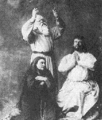Wikipedia:Selected anniversaries/July 26
This is a list of selected July 26 anniversaries that appear in the "On this day" section of the Main Page. To suggest a new item, in most cases, you can be bold and edit this page. Please read the selected anniversaries guidelines before making your edit. However, if your addition might be controversial or on a day that is or will soon be on the Main Page, please post your suggestion on the talk page instead.
Please note that the events listed on the Main Page are chosen based more on relative article quality and to maintain a mix of topics, not based solely on how important or significant their subjects are. Only four to five events are posted at a time and thus not everything that is "most important and significant" can be listed. In addition, an event is generally not posted this year if it is also the subject of the scheduled featured article or picture of the day.
To report an error when this appears on the Main Page, see Main Page errors. Please remember that this list defers to the supporting articles, so it is best to achieve consensus and make any necessary changes there first.
Images
Use only ONE image at a time
-
1882 premiere of Parsifal
-
Syncom 2
-
Canadian National Vimy Memorial
Ineligible
| Blurb | Reason |
|---|---|
| 1822 – José de San Martín met with Simón Bolívar in Guayaquil to plan for the future of Peru and South America in general. | needs more footnotes |
| 1863 – American Civil War: Union forces captured Confederate cavalry leader John Hunt Morgan and 360 of his volunteers in northeastern Ohio, ending Morgan's Raid. | needs more footnotes |
| 1953 – Fidel Castro and his brother Raúl led a group of approximately 160 rebels in an unsuccessful attack on the Moncada Barracks, thus beginning the Cuban Revolution. | Tagged with {{refimprove}}, Cuban Revolution featured on January 1 |
| 1963 – Syncom 2, the world's first geosynchronous communication satellite, was launched by NASA on a Delta B rocket from Cape Canaveral. | needs more footnotes |
Eligible
- 811 – Bulgarian forces led by Khan Krum defeated the Byzantines at the Battle of Pliska, annihilating almost the whole army and killing Byzantine Emperor Nikephoros I.
- 1882 – Richard Wagner's opera Parsifal, loosely based on Wolfram von Eschenbach's epic poem Parzival about Arthurian knight Percival and his quest for the Holy Grail, officially premiered at the Festspielhaus in Bayreuth, present-day Germany.
- 1887 – L. L. Zamenhof published Unua Libro, the first publication to describe Esperanto, a constructed international language.
- 1908 – Unable to use the services of U.S. Secret Service agents as investigators because of a federal law, U.S. Attorney General Charles Joseph Bonaparte established what is now known as the Federal Bureau of Investigation to organize his own staff of special agents.
- 1936 – The Canadian National Vimy Memorial (pictured), a memorial site near Vimy, Pas-de-Calais, France, dedicated to the memory of Canadian Expeditionary Force members killed during World War I, was unveiled.
- 1953 – In Short Creek, Arizona, police conducted a mass arrest of approximately 400 Mormon fundamentalists for polygamy.
- 1968 – After coming second to Nguyen Van Thieu in a rigged presidential election in 1967, Truong Dinh Dzu was jailed by a military court for illicit currency transactions.
- 1990 – U.S. President George H. W. Bush signed into law the Americans with Disabilities Act, a wide-ranging civil rights law that prohibits, under certain circumstances, discrimination based on disability.
- 1999 – Fighting in the Kargil War ended after Indian troops cleared the Drass in Kashmir of Pakistani forces.
- 2007 – After widespread controversy throughout Wales, Shambo, a black Friesian bull that had been adopted by the local Hindu community, was slaughtered due to concerns about bovine tuberculosis.
July 26: Independence Day in Liberia and the Maldives
- 1581 – The Act of Abjuration, the formal declaration of independence of the Dutch Low Countries from the Spanish king, Philip II, was signed.
- 1759 – French and Indian War: Rather than defend Fort Carillon near present-day Ticonderoga, New York, from an approaching 11,000-man British force, French Brigadier General François-Charles de Bourlamaque withdrew his troops and attempted to blow the fort up.
- 1882 – Boer mercenaries declared their independence from the Transvaal Republic and established the Republic of Stellaland.
- 1945 – The Labour Party won the United Kingdom general election of July 5 by a landslide, replacing Winston Churchill as Prime Minister with Clement Attlee (pictured).



